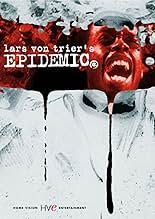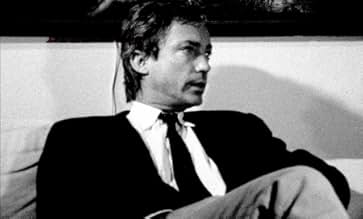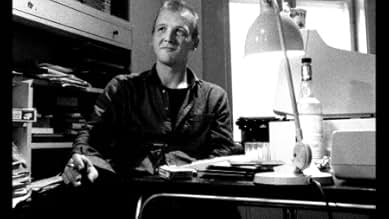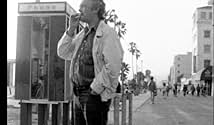AVALIAÇÃO DA IMDb
5,9/10
6,5 mil
SUA AVALIAÇÃO
Um diretor e roteirista escreve um roteiro e, no processo, a linha entre ficção e realidade fica tênue.Um diretor e roteirista escreve um roteiro e, no processo, a linha entre ficção e realidade fica tênue.Um diretor e roteirista escreve um roteiro e, no processo, a linha entre ficção e realidade fica tênue.
- Direção
- Roteiristas
- Artistas
- Prêmios
- 1 indicação no total
- Direção
- Roteiristas
- Elenco e equipe completos
- Produção, bilheteria e muito mais no IMDbPro
Avaliações em destaque
The idea of the film is great. Mixing the creation of a movie and his viewing. It's done in a very ambitious way, incredibly sophisticated and elegant when we know the budget who was assigned to the movie.
A lot of scenes are incredible, specially the one who shows the contamination of the priest, adding a reflection on the condition of the black man. Obviously the last scene is one of the most incredible things I've seen on a screen, but we can doubt the mental health of Von Trier and his crew. However maybe it's the reason he's so good...
I didn't like a few things. I think there is too much time about the creation of the movie, a few ridiculous and unappropriated moments as the story of the American letters of Niels
A lot of scenes are incredible, specially the one who shows the contamination of the priest, adding a reflection on the condition of the black man. Obviously the last scene is one of the most incredible things I've seen on a screen, but we can doubt the mental health of Von Trier and his crew. However maybe it's the reason he's so good...
I didn't like a few things. I think there is too much time about the creation of the movie, a few ridiculous and unappropriated moments as the story of the American letters of Niels
Epidemic appears to be all stylistic self-indulgence. It is filmed in black and white, with often purposely redundant subtitles. Each shot is very very long. Some are stoic, some are suddenly goofy, some are disturbing, mostly stoic. When there is dialogue, it is intellectually stimulating, but borderline irrelevant.
Mainly, it is that director Lars Von Trier and his screenplay collaborator Niels Vorsel play themselves, coming up with a last-minute script for a producer. This strand takes disproportionate turns with scenes from their script, in which Von Trier plays a radical doctor attempting to cure a modern-day epidemic. In an warped turn, the doctor finds that he himself has been spreading it. For so long, one is left without a clue as to why there is such a coincidence between the screenplay and the outside world, or any progressions of the different narrative strands' signifying signs. But it infects you. It burns you.
Whether or not the film is narcissistic, it is not form over function. Essentially, it is a basic exercise in what metaphysically affects the viewer. Consider the scene of the darker, quieter of the screenwriters in the subway, knowing predeterminately that the other one is going to die. Or when he looks in a mirror, turns to us, the camera, then the mirror again. Everything one expects would create a cohesive, sense-making narrative film is inverted and indeed develops an immediately conscious connection between itself and the audience.
That is not to say it eschews any fundamental aspect of quality. Udo Kier delivers one of the most amazing, fantastic performances I have ever seen. Really, many of the performances, whoever these actors, or characters, are, shock and deeply move us. Some scenes are entirely made up of uproarious laughter or breakdowns of screaming, in spite of the unapologetic stoicism and quiet permeating the film.
This hypnotic abstraction is truly very atmospheric and creepy. It is a transcendental, almost physiologically affecting virus that infests you for days upon being subjected to it. It is something that has to be seen and can hardly be explained. And that makes it a true work of art.
Mainly, it is that director Lars Von Trier and his screenplay collaborator Niels Vorsel play themselves, coming up with a last-minute script for a producer. This strand takes disproportionate turns with scenes from their script, in which Von Trier plays a radical doctor attempting to cure a modern-day epidemic. In an warped turn, the doctor finds that he himself has been spreading it. For so long, one is left without a clue as to why there is such a coincidence between the screenplay and the outside world, or any progressions of the different narrative strands' signifying signs. But it infects you. It burns you.
Whether or not the film is narcissistic, it is not form over function. Essentially, it is a basic exercise in what metaphysically affects the viewer. Consider the scene of the darker, quieter of the screenwriters in the subway, knowing predeterminately that the other one is going to die. Or when he looks in a mirror, turns to us, the camera, then the mirror again. Everything one expects would create a cohesive, sense-making narrative film is inverted and indeed develops an immediately conscious connection between itself and the audience.
That is not to say it eschews any fundamental aspect of quality. Udo Kier delivers one of the most amazing, fantastic performances I have ever seen. Really, many of the performances, whoever these actors, or characters, are, shock and deeply move us. Some scenes are entirely made up of uproarious laughter or breakdowns of screaming, in spite of the unapologetic stoicism and quiet permeating the film.
This hypnotic abstraction is truly very atmospheric and creepy. It is a transcendental, almost physiologically affecting virus that infests you for days upon being subjected to it. It is something that has to be seen and can hardly be explained. And that makes it a true work of art.
Epidemic (1987), directed by Lars von Trier, is a meta-cinematic exploration of the blurred line between fiction and reality. The film follows a director and screenwriter who, while working on a script about a plague, find themselves caught up in a real-life epidemic, mirroring the events they are writing. This film is a challenging and unconventional piece of work, characteristic of von Trier's early style, marked by its fragmented narrative and philosophical underpinnings.
The performances are fittingly restrained, with Allan De Waal and Ole Ernst bringing a sense of detachment and intellectual depth to their characters, reflecting the film's thematic concerns. The film's low-budget aesthetic, with shaky handheld camerawork and raw sound design, serves to reinforce the sense of chaos and uncertainty that permeates the narrative. It's a deliberate stylistic choice that enhances the surreal, almost documentary-like atmosphere, but it may be off-putting to some viewers who prefer more polished filmmaking.
Von Trier's direction is methodical, and while the premise of the film offers intriguing possibilities, the execution can feel disjointed and unclear at times. The dialogue often veers into abstract territory, and the narrative structure is fragmented, leaving viewers to piece together the meaning behind the events. The film's slow pace, combined with its minimalistic style, can make it feel like a deliberately inaccessible work, challenging the audience's patience.
Epidemic is a film that operates on multiple levels, blending political, artistic, and existential commentary with a quasi-documentary style. While it offers some thought-provoking moments, it struggles to maintain coherence and impact over its runtime. It is best suited for those interested in avant-garde cinema or those looking to delve into the early works of Lars von Trier, but casual viewers may find it frustrating.
Rating: 6/10. A provocative, if uneven, exploration of the intersection between art, reality, and societal collapse.
The performances are fittingly restrained, with Allan De Waal and Ole Ernst bringing a sense of detachment and intellectual depth to their characters, reflecting the film's thematic concerns. The film's low-budget aesthetic, with shaky handheld camerawork and raw sound design, serves to reinforce the sense of chaos and uncertainty that permeates the narrative. It's a deliberate stylistic choice that enhances the surreal, almost documentary-like atmosphere, but it may be off-putting to some viewers who prefer more polished filmmaking.
Von Trier's direction is methodical, and while the premise of the film offers intriguing possibilities, the execution can feel disjointed and unclear at times. The dialogue often veers into abstract territory, and the narrative structure is fragmented, leaving viewers to piece together the meaning behind the events. The film's slow pace, combined with its minimalistic style, can make it feel like a deliberately inaccessible work, challenging the audience's patience.
Epidemic is a film that operates on multiple levels, blending political, artistic, and existential commentary with a quasi-documentary style. While it offers some thought-provoking moments, it struggles to maintain coherence and impact over its runtime. It is best suited for those interested in avant-garde cinema or those looking to delve into the early works of Lars von Trier, but casual viewers may find it frustrating.
Rating: 6/10. A provocative, if uneven, exploration of the intersection between art, reality, and societal collapse.
I obviously was in the right mood, since I don't give it a horrible mark. I do give it a 6 out of 10, because it is obviously such a low budget movie and it's definitely very original, but other than that, I am still amazed I watched it till the end.
Two screenwriters are trying to do in 5 days what they barely succeeded in one and a half years, that is write a script. They lost their original screenplay, which by now they can barely remember how it started, due to a bad disk. Each day is accompanied with scenes of their creative process, scenes from the movie they would do and dialogues with different people.
Now it happens that I've just written an IMDb comment that said "Funny little things: Udo Kier plays a short role in this movie, and he is really young". Deja vu! Udo Kier plays in this one, as well.
The movie is shot in black and white, probably by the same single camera, and the sound is almost not processed giving the whole movie a documentary like feeling. There are a lot of things written between the lines, the satire of the government and film industry being the most obvious.
Conclusion: you should watch this mostly if you're Danish. Else if you are a movie critic or deep into films. It is NOT a horror movie. A movie that has some gore at the very end is not horror. And also you have to have the right set of mind to watch it.
Two screenwriters are trying to do in 5 days what they barely succeeded in one and a half years, that is write a script. They lost their original screenplay, which by now they can barely remember how it started, due to a bad disk. Each day is accompanied with scenes of their creative process, scenes from the movie they would do and dialogues with different people.
Now it happens that I've just written an IMDb comment that said "Funny little things: Udo Kier plays a short role in this movie, and he is really young". Deja vu! Udo Kier plays in this one, as well.
The movie is shot in black and white, probably by the same single camera, and the sound is almost not processed giving the whole movie a documentary like feeling. There are a lot of things written between the lines, the satire of the government and film industry being the most obvious.
Conclusion: you should watch this mostly if you're Danish. Else if you are a movie critic or deep into films. It is NOT a horror movie. A movie that has some gore at the very end is not horror. And also you have to have the right set of mind to watch it.
Look, I know a substantial proportion of the American population get a little hot under the collar when funny-talking foreigners start criticising the American government and way of life, but hey - when you're the only country in the world inclined to and capable of dictation of world policy, you gotta take it on the chin. While Von Trier even makes me wince sometimes (the end credits to Dogville for instance), it's his point of view and is worthy of thought. He isn't here to lick your derrière clean for you - if you can't take a little criticism of the homeland, I'd steer clear of any imported movies for a while. Anyhoo, when truly disrespectful films like Titanic break records and reap awards with nary a raised eyebrow, it's double standards to expect non-US films to walk the line you'd like. Von Trier is a genius film-maker... you may not agree with his politics, but you cannot doubt his talent.
Você sabia?
- CuriosidadesThe story Udo Kier's character Udo tells Lars and Niels, is actually the real story of Udo Kier's birth.
- Cenas durante ou pós-créditosThe film's title appears in red letters in the upper left corner of the screen for the entire length of the film.
- ConexõesFeatured in The Making of 'Europa' (1991)
- Trilhas sonorasTannhäuser (The Overture)
Composed by Richard Wagner
Principais escolhas
Faça login para avaliar e ver a lista de recomendações personalizadas
- How long is Epidemic?Fornecido pela Alexa
Detalhes
Bilheteria
- Faturamento bruto mundial
- US$ 938
- Tempo de duração
- 1 h 46 min(106 min)
- Cor
- Mixagem de som
- Proporção
- 1.66 : 1
Contribua para esta página
Sugerir uma alteração ou adicionar conteúdo ausente





















